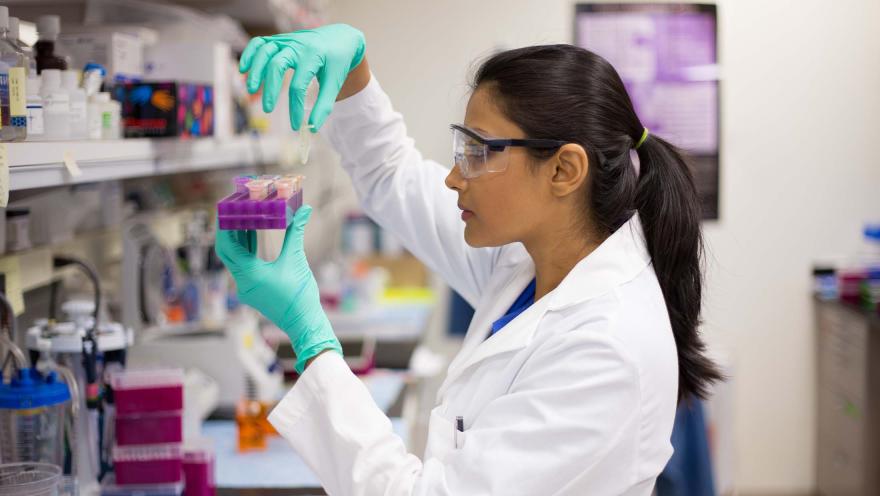The ALS Association has awarded nearly $800,000 to support 16 innovative research projects that have the potential to significantly impact the experience of ALS by optimizing current care and treatments, finding new treatments and cures, and aiding with diagnosis and prevention.
These grants – the first awards made through the Association’s Seed Grant Program – provide one year of support (up to $50,000) so researchers can gather the data they need to secure follow-on funding and partnerships.
“Pursuing new and innovative lines of research often becomes a ‘chicken or the egg’ scenario for investigators. They can’t secure funding without data, but it’s difficult to collect data without funding,” said Dr. Paul Larkin, director of research at The ALS Association. “Our Seed Grant Program helps fill that initial funding gap so researchers can produce data for early go/no-go decisions on novel and potentially high-impact research directions in ALS.”
During the 2022 awards cycle, seed grants were awarded to:
- Jason Ackrivo, M.D., University of Pennsylvania ($49,995), to test the utility of a sensor on the skin surface that measures carbon dioxide levels as a way to identify weakened breathing in people living with ALS.
- John Altrip, Ph.D., Royal Papworth Hospital ($50,000), to help prevent ventilatory failure in people living with ALS using a hand-held, personal carbon dioxide monitor at home.
- Chelsey Carter, Ph.D., Yale University ($49,999), to explore care and caregiving experiences of non-white people living with ALS and caregivers.
- Richard Daneman, Ph.D., University of California San Diego ($50,000), to investigate whether targeting the blood-brain barrier could be a new treatment strategy for ALS.
- Emma Dempster, Ph.D., University of Exeter ($49,987), to develop a blood test that can identify dying motor neurons in the early stages of ALS development.
- Christopher Donnelly, Ph.D., University of Pittsburgh ($50,000), to better understand how the TDP-43 affects the health of motor neuron axons and contributes to neurodegeneration.
- Jeannine Heckmann, Ph.D., University of Cape Town ($50,000), to lay the foundation for an ALS research network and virtual patient support community in Africa.
- Eran Hornstein, M.D., Ph.D., Weizmann Institute of Science ($50,000), to investigate the interactions and functions of TDP-43 in human motor neurons to better understand ALS development.
- Jack Humphrey, Ph.D., Icahn School of Medicine at Mount Sinai ($49,974), to identify the genes that TDP-43 interacts with in motor neurons, which could become new targets for ALS treatments.
- William Janes, OTD, University of Missouri ($50,000), to test a system where people living with ALS and their healthcare providers can request custom assistive devices that meet their specific needs.
- Stephen Kolb, M.D., Ph.D., The Ohio State University ($49,442), to characterize the effects of mutations in the human kinesin family member 5A (KIF5A) gene, which were recently identified as a genetic cause of ALS.
- Marco Peviani, Ph.D., University of Pavia ($50,000) to determine whether the amount of a protein called Axl in blood or cerebral spinal fluid corresponds to ALS progression, disease severity and survival.
- Nortina Shahrizaila, Ph.D., University of Malaya ($49,842), to investigate how tropical infections might contribute to the death of motor neurons and the development of ALS.
- Sergey Stavisky, Ph.D., University of California Davis ($50,000), to test whether it’s possible to restore speech in people living with ALS using a brain-computer interface.
- Ana Maria Vranceanu, Ph.D., Massachusetts General Hospital ($49,995), to develop a resiliency program to help support people living with ALS and their caregivers after a confirmed diagnosis.
- Vladimir Zhemkov, Ph.D., Cedars-Sinai Medical Center ($49,995), to create a new type of cellular model of ALS that can help researchers study new treatments in the future.
If you would like to receive monthly ALS research updates, SUBSCRIBE to our newsletter, Research Matters. To learn more about the research we fund, visit our website HERE.

